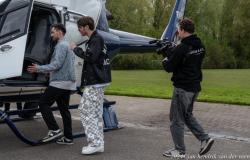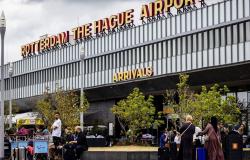Bats in the cavity wall slow down sustainability. This will also be noticed by Groningen households that receive money for insulation due to gas extraction. “The pace is many times slower than what our companies could handle,” says Piet-Jan Dijkstra of the insulation industry association Venin.
With the tightened rules surrounding bats, work has not become easy, sighs Geir Lutjes, employee at Van den Berg Isolatie in Borger. “If we cannot rule out that bats are present, additional research is needed. Then you notice that some people are reluctant to isolate at all.”
When insulating, companies must investigate whether bats, house sparrows or swifts live in the walls and roofs. This has been necessary for twenty years, as laid down in the Flora and Fauna Act, later in the Nature Conservation Act and now in the Environmental Act. But for bats in the cavity wall, this obligation was taken very seriously by few insulation companies for a long time.
That changed after a ruling by the Council of State in August 2023, where the insulation company Isosun from Best was reprimanded. Just looking between the walls with a camera is no longer enough. Bats are difficult to spot due to rubble between the walls. The size of the mammal doesn’t help either. For example, the common common pipistrelle bat is only the size of a matchbox.
Expensive and lengthy rules
If you now want to have cavity walls sprayed shut, ecological research is required according to the law. That can cost as much as 5,000 euros: three times as much as the actual insulation. These are costs for the homeowner himself. Research by an ecologist can also take up to a year.
Because insulation stagnated everywhere in the Netherlands, Housing Minister Hugo de Jonge stated in October that insulation companies that have been trained in the principles of nature-friendly insulation should also be able to work without ecological research. Companies must then do a ‘quick scan’ and work according to a ‘natural calendar’.
The latter means taking the biological bat clock into account. During the four-month maternity period for bats between April and July, companies are not allowed to isolate or chase animals from the wall. This ‘making nature free’ can be done by means of: exclusion flaps , boxes that allow bats to leave the home but not enter it. During the four-month hibernation of bats from mid-November to mid-March, companies are also not allowed to insulate. They may then make the house nature-free, but the animals will only leave the house when they come out of their sleep. That leaves four months left (March and August to October) in which companies are allowed to isolate.
Companies collapse
Many insulation companies find the rules problematic. In Groningen – where people will soon be able to insulate en masse for 20,000 or 40,000 euros – long queues will soon arise. According to Piet-Jan Dijkstra, chairman of the trade association Venin Isolerend Nederland, many insulation companies are getting into trouble. They can do much faster, but now they have to wait a long time. “The pace is many times slower than what the companies could handle. As a result, they have to fire people.”
According to Dijkstra, the high costs for an ecological study are not in proportion to the insulation itself. “Companies have already collapsed. This is especially painful because many of them started scaling up three years ago when subsidy funds became available from the National Insulation Program. This would allow a much larger share of homes to be insulated.”
The Smit Isolatie Groep from Veendam conducts its own research into bats. The company charges 300 to 350 euros for a quick scan of an average home to determine whether there are animals. “Sometimes we take part for our own account,” says director Jack Guikema. “We want to keep it somewhat affordable for the consumer.” He has no problems with the new rules regarding bats. “This did not suddenly come out of the blue.”
‘Cowboys’ are ruining the market
Tom Niemeijer, manager at insulation company BEVO in Ter Apel, also thinks so. “We should not continue to kill protected animal species. Nature conservation and insulation should go together.”
But then everyone must adhere to those rules, says Niemeijer. As a certified company, BEVO adheres to the rules, but according to him there are quite a few ‘cowboy companies’ that do whatever they want. “There is no control over that. We spend a lot of money to do everything right, but there is unfair competition.”
According to Niemeijer, it is also debatable whether only the insulation sector should have to deal with these strict requirements. “We are not allowed to reach the cavity wall, but a contractor is allowed to remove a wall or replace a roof.”
Industry chairman Piet-Jan Dijkstra also believes that not all companies adhere to the rules is a major problem. “That is also the pain of our supporters: they are losing their jobs to non-certified companies.”
Future
Ultimately, the goal is for each municipality to have a ‘species management plan’ (SMP). This is two years of ecological research within a specific region, in which it was investigated where the bats roost, hibernate and roost. “Once this has been mapped out, you can insulate much more quickly in some places,” says Dijkstra. However, he fears that it will take a long time before every municipality has such an SMP. “There is a chronic shortage of ecologists who can do this.”
With such an SMP, alternative locations for the bats can also be considered. Because that responsibility now also lies with the insulation companies. Companies must leave a hole so that the bats can re-enter the cavity wall. But this is a sensitive issue for the insulation companies, which do not leave behind the most optimal situation. “While the companies do give their guarantee on this. It’s like selling a boat with a hole in the hull.”
Tags: lot money insulate Groningen North Drenthe bat bothering
-





